Huobi bids farewell to the Li Lin era; can the new actual controller, Baidu Capital, create a new situation?
Written by: Wu Hai, TT, PANews Author
"The biggest gain in 10 years of entrepreneurship is the upgrade of cognition. Many entrepreneurs have very bad habits, that is, they always complain, but fail to realize that any entrepreneurial ceiling is always the founder himself." Four years ago, Li Lin spoke about this during an interview at the opening ceremony of the CEIBS Entrepreneurship Camp.
Four years later, perhaps realizing that he had become the ceiling restricting Huobi's development, Li Lin sold all his shares in Huobi to carefully selected buyers and said goodbye to Huobi, which he had led for 9 years.
Li Lin's Sale of Huobi Shares Finalized
On October 8, Huobi Global officially announced that the holding company of Huobi Global had transferred all of its shares in Huobi Global to a fund under Baidu Capital, making Baidu Capital the largest shareholder and actual controller of Huobi Global.
This transaction only involves a change of controlling shareholder and will not affect the existing core management and operational team. The details of the transaction also include a series of important measures to ensure the normal operation of the platform, enhance risk management and capital reserves, ensure the safety of user assets, and maintain the stability of the core team.
The long-rumored news about Li Lin selling his Huobi shares has finally been confirmed, with the final buyer being a name unfamiliar to those in the industry. In August, Bloomberg reported that Huobi Group founder Li Lin was negotiating with several investors to sell the majority of his stake in Huobi at a valuation of up to $3 billion, which could be the largest acquisition in the industry since the global cryptocurrency market crash.
According to insiders, Huobi had discussions with several financial personnel, hoping to sell about 60% of the company he founded nearly 10 years ago. Justin Sun, the founder of Tron, and crypto billionaire SBF's FTX had preliminary contact with Huobi regarding the share transfer. Shareholders such as ZhenFund and Sequoia China learned of Li Lin's decision at the July shareholders' meeting, with the transaction expected to be completed as early as the end of August. The valuation sought by Li Lin was between $2 billion and $3 billion, which means the sale transaction could exceed $1 billion. Subsequently, the parties involved denied contact with FTX and Justin Sun.
After Li Lin encountered issues in Shanxi last year, there were significant personnel changes within Huobi, with many executives leaving, and Li Lin began seeking to distance himself from Huobi. At the end of last year, Li Lin resigned as CEO and executive director of the Hong Kong-listed Huobi Technology, with Wu Shupeng, who came from the public security system, taking over as CEO.
What is Baidu Capital, the New Actual Controller of Huobi?
According to information on Baidu Capital's official website, Baidu Capital is headquartered on Queen's Road in Hong Kong and was founded in 2008, originally named BEYOND CAPITAL, and renamed About Capital in March 2010. According to the Hong Kong Securities Brokers Encyclopedia, Baidu Capital obtained a financial license in 2013 and became a licensed fund management company in Hong Kong. Its main product is a securities fund investing in the Asia-Pacific market, which aims to reduce market risk and enhance absolute returns for investors through a fundamental analysis-based long-short strategy supplemented by opportunistic trading.
The fund monthly report disclosed on Baidu Capital's website shows that it has long been involved in investments in the crypto field. In the fund monthly report of January 2021, Baidu Capital mentioned that its investments in the cryptocurrency sector had yielded good returns, but did not disclose the proportion in its portfolio. At that time, the strategy of investing in cryptocurrencies was not only seen as having potential for good long-term returns but also moderately diversified its investment portfolio, as cryptocurrencies had a low correlation with other assets in its portfolio.
By the fund monthly report of March 2021, the proportion of the crypto investment portfolio was disclosed to be 9.1%, which grew to a maximum of 10.2% in April, then decreased to 4.9% in May, and by August 2022, its portfolio contained 3.6% in crypto assets.
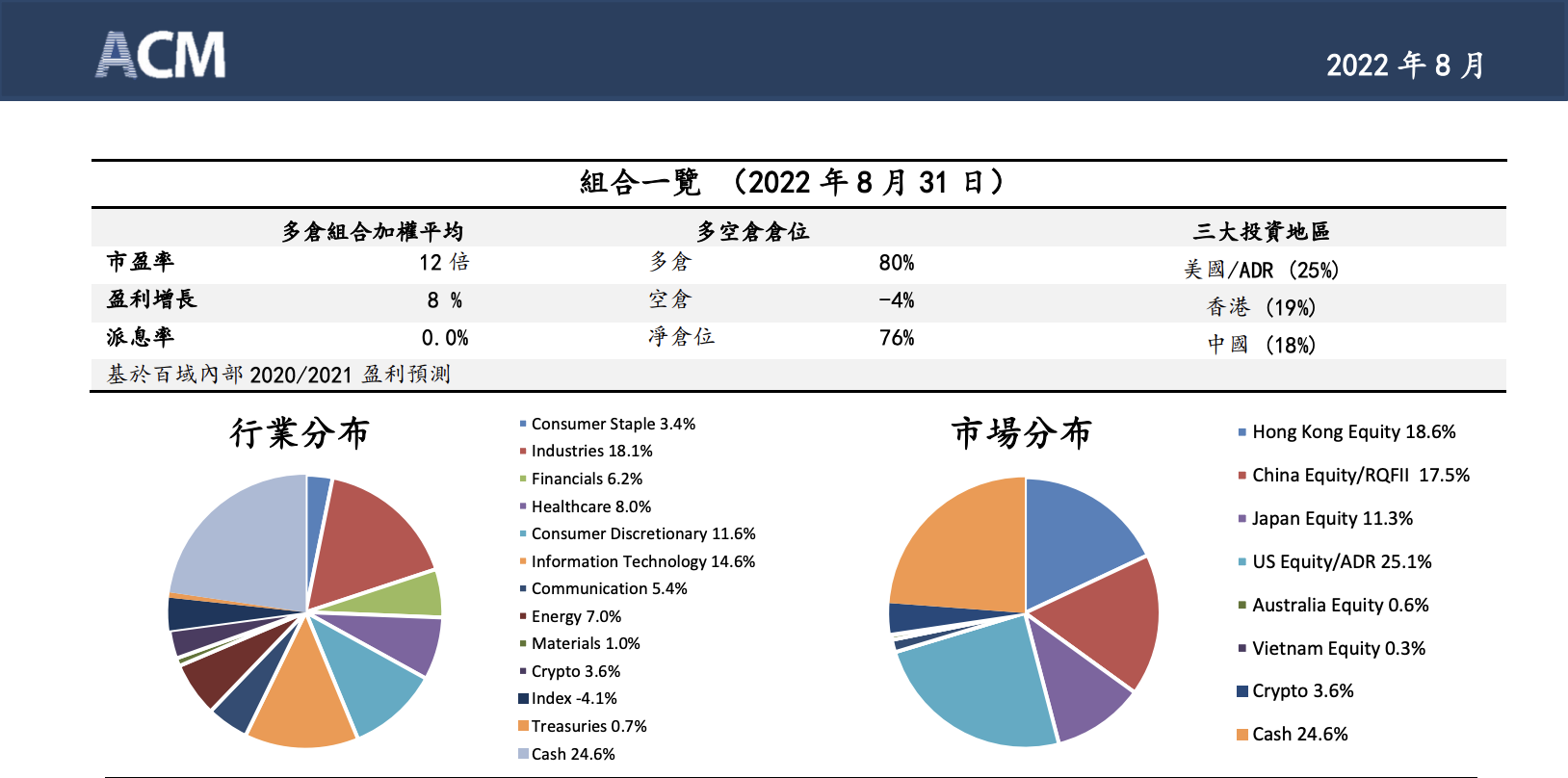
In the fund monthly report of April 2022, Baidu Capital reviewed the collapse of Luna and analyzed whether stablecoins like USDT could also collapse, stating that under appropriate regulation, cryptocurrencies would be accepted by institutional investors and have huge growth potential, expressing a long-term and firm optimism about the cryptocurrency sector. This may be the original intention of Baidu Capital in taking over Huobi.
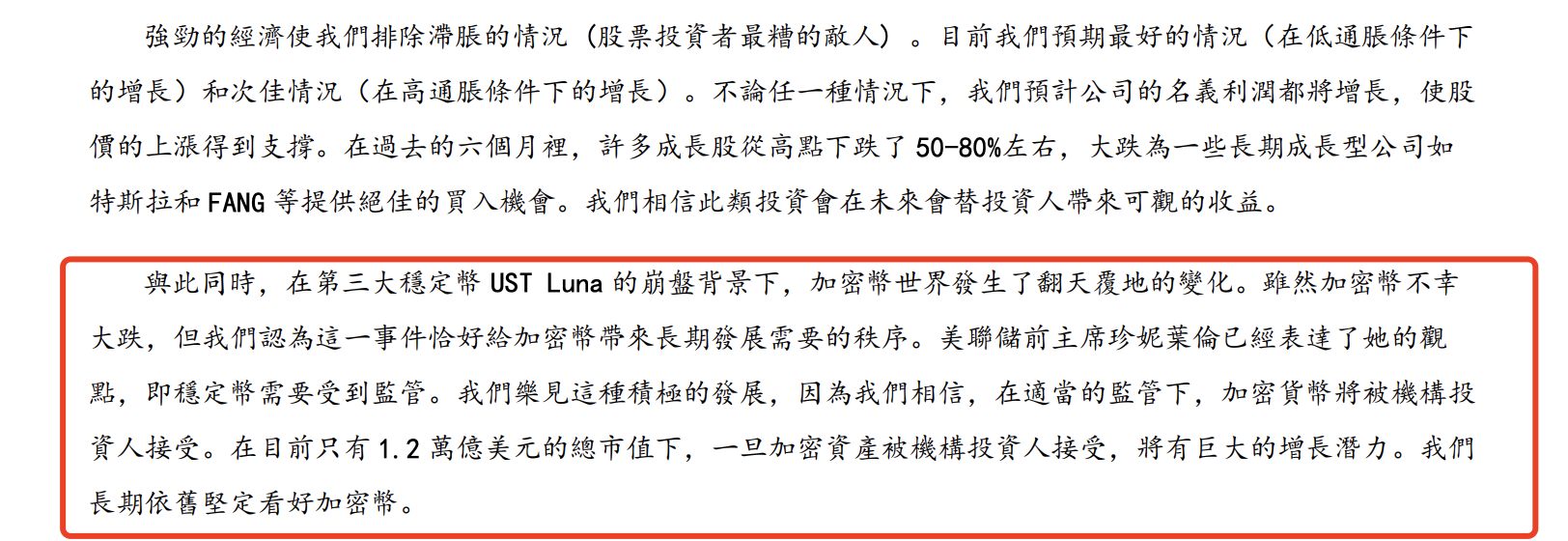
The fund monthly report from August shows that Baidu Capital currently manages assets of $52 million. This raises questions about how such a management scale can absorb Huobi, as previous market news indicated that Li Lin's Huobi shares were valued at $2-3 billion, with the transaction amount being at least over $1 billion.
In fact, Baidu Capital is backed by Jinglin Asset, a top private equity firm in China with a scale of hundreds of billions.
According to information from Baidu Capital's official website and the Hong Kong Securities Brokers Encyclopedia, the partners of Baidu Capital are Ted Chen and Shan Liming. Ted Chen is responsible for formulating the company's development goals and strategies, as well as major investment decisions. He has over 20 years of experience in the financial investment industry and was a founding partner of Jinglin Asset Management, where he established and operated its Hong Kong company. Shan Liming, before joining Baidu Capital, was a fund manager at Shanghai Shenwan Hongyuan Fund, managing investments in the A-share market.
Ted Chen was involved in the founding of Jinglin Asset Management, which is now a well-known private equity firm in China and one of the earliest private equity firms to focus on U.S. stocks, benefiting significantly from the growth of Chinese concept stocks. Although recently it has been in the spotlight for apologizing to channels due to poor performance, data from PANews shows that as of August this year, Jinglin Asset has achieved a cumulative return of 17.5 times since its establishment in 2006, and its flagship product "Shenzhen Guotou Jinglin Stable Securities Investment" has recorded a cumulative return of 16.8 times over 16 years. Before facing a performance downturn last year, Jinglin Asset was regarded as a "god-like existence" in the industry, with performance comparable to Warren Buffett.
Jinglin Asset's founder, Jiang Jinzhi, has held positions such as manager of the national debt and futures department at the Shenzhen Stock Exchange, assistant president at Guosen Securities, and chairman of Yuehai Securities (Hong Kong). He holds a master's degree from the Graduate School of the People's Bank of China. The president and legal representative is Gao Bin, who previously served as a senior staff member and deputy director of the Market Supervision Department of the China Securities Regulatory Commission, inspector at the Shenzhen Stock Exchange, and assistant general manager of the China Securities Depository and Clearing Corporation.
There are claims that Li Lin rejected several buyers with backgrounds in the crypto industry among the potential buyers and chose one with the cleanest background. From the perspective of Baidu Capital and its potential affiliate Jinglin Asset, this is indeed a quality buyer.
Li Lin stated in the official announcement: "After exiting the mainland China market at the end of 2021, our path to global development is full of challenges. Huobi Global urgently needs shareholders with more international resources and a global vision to lead Huobi into the next journey. We believe that Baidu Capital can bring new momentum to Huobi's globalization process."
After the transaction was completed, Li Lin also published a statement in his social circle regarding the completion of the equity transfer and asset delivery of Huobi Global, reminiscing about his nine-year experience in founding Huobi and looking forward to the future.
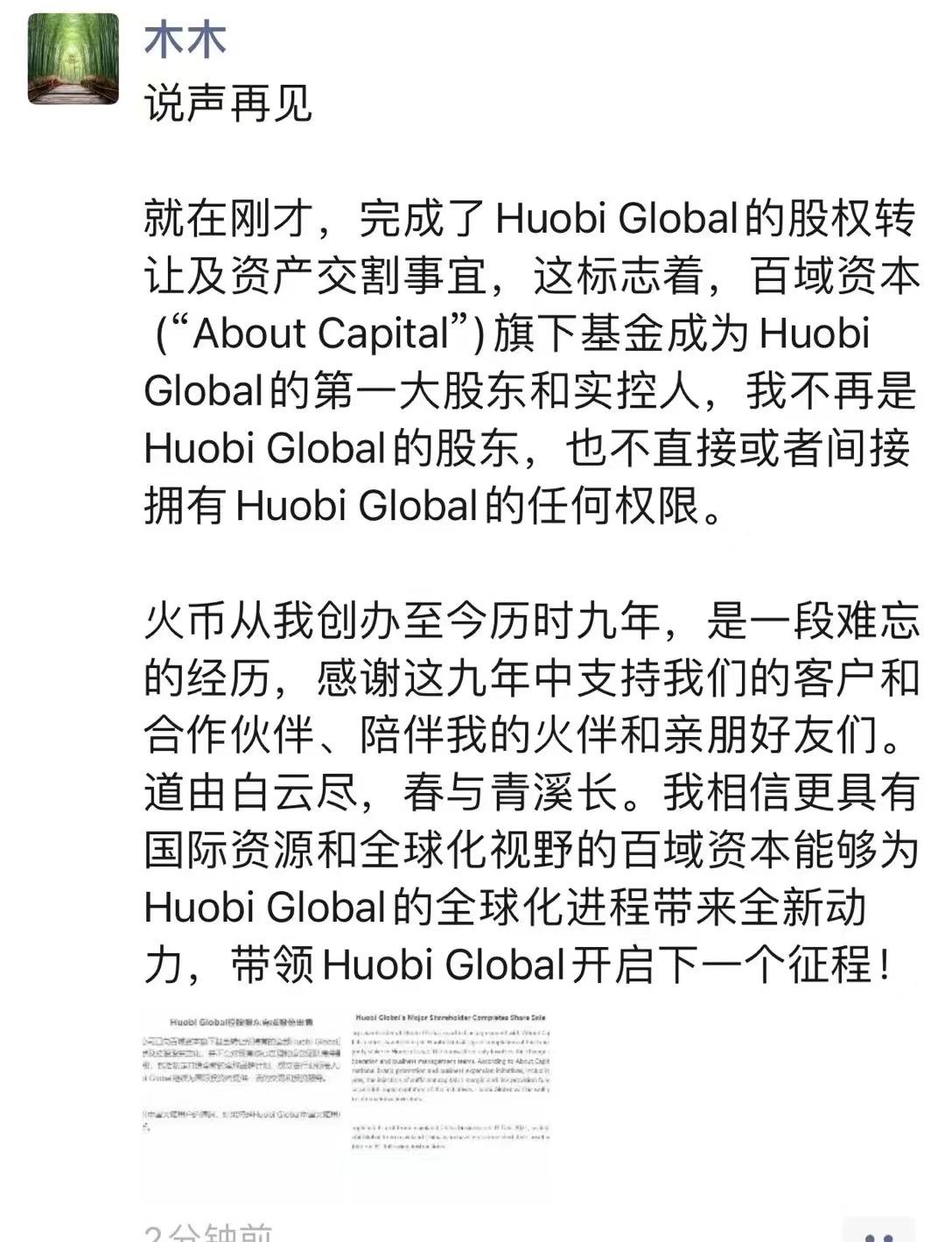
Li Lin's Nine-Year Entrepreneurship History with Huobi
Born in 1983, Li Lin is approaching his forties. After graduating with a master's degree from Tsinghua University in 2007, he joined the well-known tech company Oracle, but he was not satisfied with the 9-to-6 job. After two years of work, in April 2009, he co-founded Youyi Network with friends, but after a year, it only gained 70,000 registered users and did not achieve profitability, leading to the failure of his first startup.
In 2010, group buying suddenly became popular, and Li Lin seized the opportunity to create a group buying navigation website, earning his first pot of gold. In 2011, because Li Lin was deeply involved in the tech circle, he accidentally became aware of Bitcoin, and by the spring of 2013, Bitcoin had become a hot topic in the tech community, prompting Li Lin to buy his first Bitcoin.
At that time, the domestic Bitcoin exchange was Bitcoin China, but due to poor user experience in the early days, Li Lin was inspired to create a cryptocurrency exchange. Thus, Huobi was born.
At the end of the third quarter of 2013, Huobi went online. Although there were many exchanges at that time, it was during a Bitcoin bull market, and Huobi gained popularity by offering zero trading fees, quickly becoming China's largest Bitcoin trading platform. It is reported that within 9 days of going online, the daily trading volume reached 1 million RMB; six months after its launch, the daily trading volume exceeded 1.5 billion RMB. Subsequently, it received investments from Xu Xiaoping and others, and secured a multi-million dollar Series A investment from Sequoia Capital. Huobi also gained the trust of early users due to its strong focus on user experience and service, with Li Lin personally addressing some early user issues.
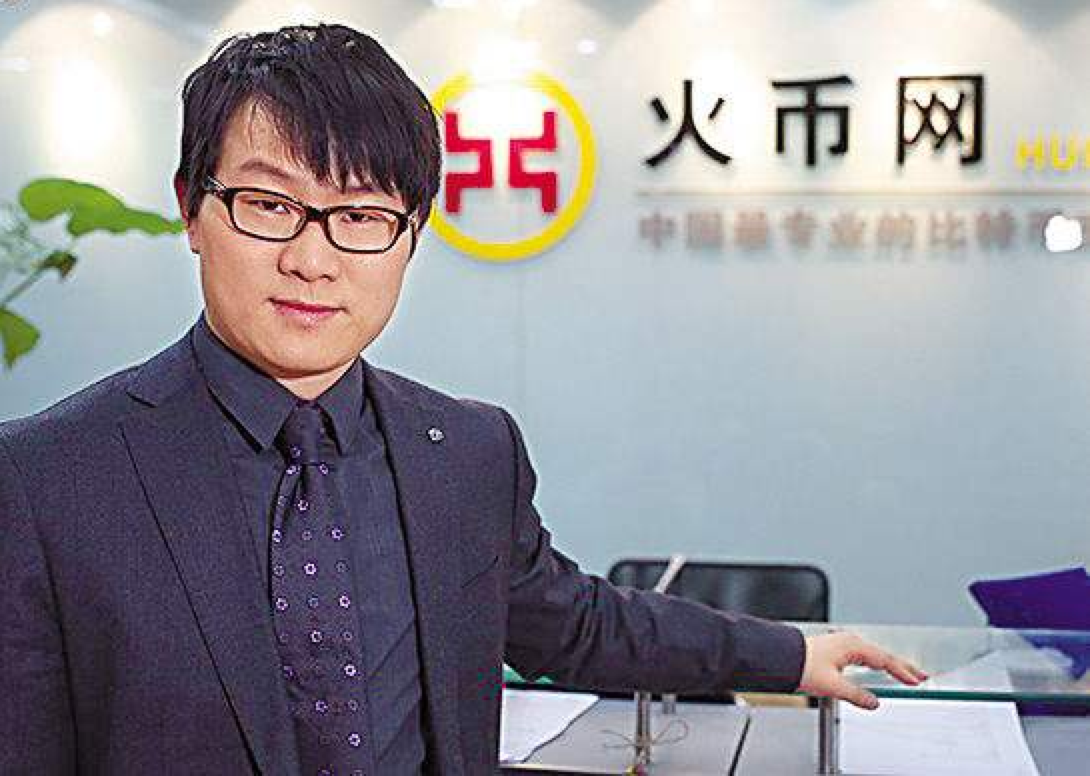
As the crypto industry gradually grew, Huobi, as a leading trading platform, continuously expanded its products and services. The number of employees at Huobi grew to over 2,000, with annual profits reaching tens of billions of dollars. Li Lin personally ranked 531st on the 2019 Hurun Report's list of self-made billionaires born in the 1980s, with assets of 7.5 billion RMB.
The turning point came on September 4, 2017, when seven departments, including the People's Bank of China, the Central Cyberspace Administration, the Ministry of Industry and Information Technology, the State Administration for Industry and Commerce, the China Banking Regulatory Commission, the China Securities Regulatory Commission, and the China Insurance Regulatory Commission, jointly issued a notice on preventing risks associated with token issuance and financing, declaring ICOs illegal financial activities, prohibiting new projects, and mandating the orderly exit of existing projects, clearly banning any token issuance and financing activities, requiring all ICO token trading platforms to cease trading by the end of the month. The "September 4th Ban" brought the previously wild virtual currency under a stringent financial regulatory framework.
At that time, Binance, another crypto asset trading platform, chose to go overseas, and Huobi also began to intensify its efforts to expand its overseas business. In addition to trading and asset management, Huobi also provided mining pools, wallets, investments, public welfare, and other services to the global market, building an upstream and downstream ecosystem for Huobi.
In August 2018, Huobi acquired the Hong Kong-listed company Tongcheng Holdings, which was later renamed Huobi Technology. In September 2018, Huobi obtained a license for a Japanese crypto asset exchange by acquiring BitTrade, which was then renamed Huobi Japan. In December of the same year, Huobi obtained a DLT license in Gibraltar to expand into the European market. According to previous media reports, Huobi also has local branches in countries such as Indonesia, Argentina, and Thailand. From 2018 to 2020, during the last crypto winter, various exchanges engaged in fierce competition, with Binance seizing the top position due to its overseas advantages, while Huobi closely followed. Although Huobi continuously obtained licenses overseas, its overseas business development was not satisfactory, as it failed to find excellent managers to capture local markets, and the domestic user market remained Huobi's top priority.
Regulation loomed over the crypto industry like a sword of Damocles, with risks potentially arising at any moment. In November 2020, Huobi's COO Zhu Jiawei was investigated, and there were rumors that Li Lin was also under investigation by relevant departments in Shanxi. The Shanxi incident laid the groundwork for Li Lin's complete withdrawal from Huobi.
On May 18, 2021, multiple domestic ministries issued a joint announcement on preventing risks associated with virtual currency speculation and trading. In September 2021, the severity of the policies was intensified, with the Supreme People's Procuratorate, the Ministry of Public Security, the China Banking and Insurance Regulatory Commission, the State Administration of Foreign Exchange, and other departments jointly issuing a notice on further preventing and addressing risks associated with virtual currency trading and speculation, severely cracking down on virtual currency trading and speculation, as well as trading platforms providing virtual currency trading services to mainland users.
The tightening of policies and regulations had a significant impact on Huobi, which primarily served domestic users, leading Li Lin to contemplate withdrawal.
In September 2021, Huobi announced that it would complete the orderly exit of mainland Chinese users while ensuring the safety of user assets, stating that it would close the recharge function for mainland Chinese users on December 14 and prohibit them from conducting cryptocurrency trading. By December 31, Huobi would remove the OTC channel for RMB to crypto asset exchanges.
Li Lin also expressed his feelings directly in the HT large user WeChat group on October 6, 2021: "Only family cannot be replaced by others. Without Huobi, everyone will still have Binance and OK, but without parents and children, no one can replace me." Some Huobi employees said that Li Lin was very loyal, and it was precisely this loyalty that led him to make different decisions compared to other exchange founders.
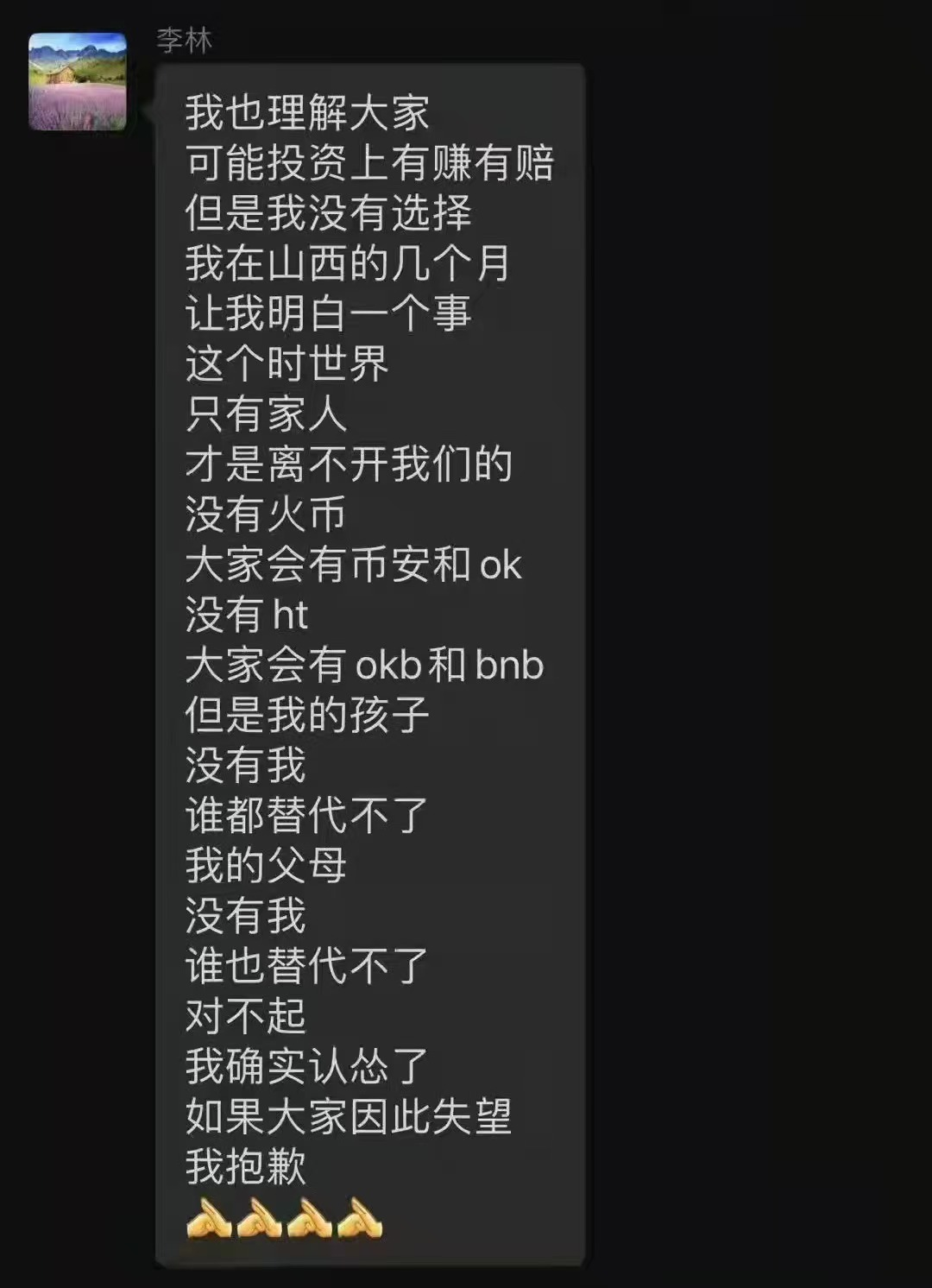
Old Huobi employees referred to Li Lin as "Mumu Ge." Today, Mumu has also been added to Huobi's resignation group, and Li Lin mentioned that Huobi's latest employee number is approaching 9,000. In the hearts of many early employees, Li Lin is a trustworthy boss. According to Zhang Li's description, Mumu Ge lives up to the title of "brother," as he has always lent a helping hand to those who have worked hard alongside him over the years. An old colleague from Huobi told me, "If I have any major issues I can't solve, I will turn to him for help. At least I believe Boss Li can help arrange things." However, as the company grew and the crypto industry developed rapidly, Li Lin also found it challenging to manage the team. He had publicly stated that his understanding of human nature was still insufficient, often misjudging people and trusting the wrong individuals. The corruption issues among early executives and the problems of large enterprises became significant factors restricting Huobi's development later on.
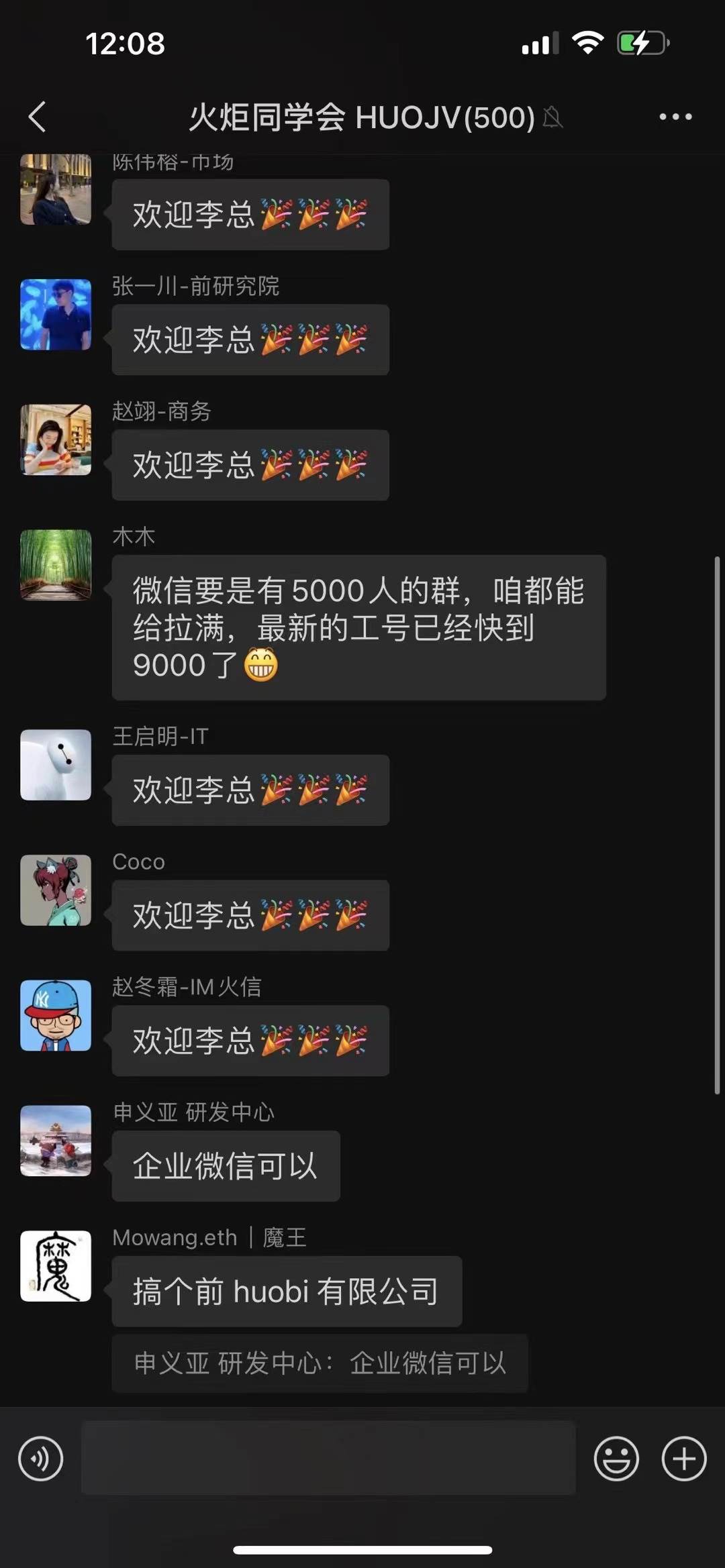
Now, the era of Li Lin as a top figure in the crypto asset food chain has come to an end. According to Coinmarketcap data, Huobi's spot trading volume has dropped from second place to twelfth. Without Li Lin, Huobi may have shed the "ceiling" limiting its domestic development and may welcome new opportunities for growth.
Just as each bull market has its hot sectors, each bull market also sees the emergence of various representative figures. As history moves forward, we bid farewell to Li Lin, the number one player in the crypto space. It remains to be seen how Huobi, now under the control of Baidu Capital, will leverage its overseas experience to open up new avenues and whether it can return to the ranks of the top three in the industry.











